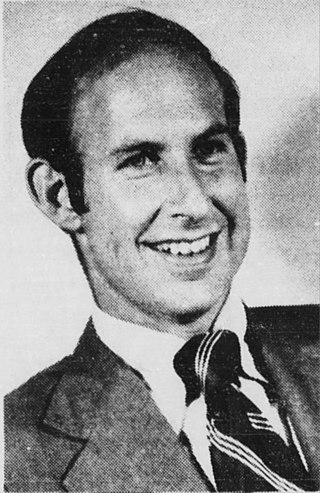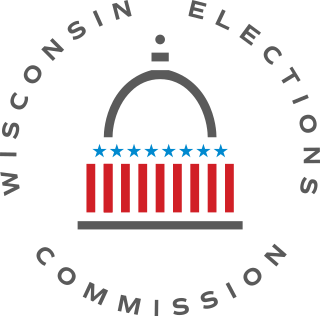Related Research Articles

The Wisconsin Supreme Court is the highest appellate court in Wisconsin. The Supreme Court has jurisdiction over original actions, appeals from lower courts, and regulation or administration of the practice of law in Wisconsin.

Lynn Steven Adelman is an American lawyer, judge, and former politician. He has served as a United States district judge for the United States District Court for the Eastern District of Wisconsin, since December 1997. Earlier in his career, he served 20 years in the Wisconsin State Senate, representing southwest Milwaukee County and neighboring municipalities.

Charles Joseph "Chuck" Chvala is an American real estate dealer, lawyer, and former politician. He served 20 years in the Wisconsin State Senate, representing Dane County, and was the Democratic caucus leader from 1995 through 2002. His political career was ended by a 2002 scandal which found he and other lawmakers had illegally utilized state employees for campaign work.
Paul Coulter Gartzke was an American lawyer and judge. He served 18 years as presiding judge of the Wisconsin Court of Appeals in the Madison-based District IV court.
The 2011 Wisconsin Act 23 established a requirement for nearly all voters to present approved photo identification to cast a ballot. It was one of many new voter ID laws in the United States. Act 23 was developed by Republican Governor Scott Walker and the Republican controlled Wisconsin Legislature during a walkout by Democratic lawmakers as part of the 2011 Wisconsin protests.
The Wisconsin Government Accountability Board (G.A.B.) was a regulatory agency of the U.S. state of Wisconsin which administered and enforced Wisconsin law pertaining to campaign finance, elections, ethics, and lobbying. The board was composed of six retired Wisconsin judges who served staggered, six-year terms. The board was created in 2007 as an attempt to reform and modernize Wisconsin's elections and ethics management. The board was dissolved in 2016 by the Republican legislature and replaced by two new commissions with explicitly partisan appointees, over the objections of Democratic legislators.
Shelby County v. Holder, 570 U.S. 529 (2013), is a landmark decision of the Supreme Court of the United States regarding the constitutionality of two provisions of the Voting Rights Act of 1965: Section 5, which requires certain states and local governments to obtain federal preclearance before implementing any changes to their voting laws or practices; and subsection (b) of Section 4, which contains the coverage formula that determines which jurisdictions are subject to preclearance based on their histories of racial discrimination in voting.
David W. Opitz is a former member of the Wisconsin State Assembly and the Wisconsin State Senate.
Voter suppression in the United States consists of various legal and illegal efforts to prevent eligible citizens from exercising their right to vote. Such voter suppression efforts vary by state, local government, precinct, and election. Voter suppression has historically been used for racial, economic, gender, age and disability discrimination. After the American Civil War, all African-American men were granted voting rights, but poll taxes or language tests were used to limit and suppress the ability to register or cast a ballot. The Civil Rights Act of 1964 and the Voting Rights Act of 1965 improved voting access. Since the beginning of voter suppression efforts, proponents of these laws have cited concerns over electoral integrity as a justification for various restrictions and requirements, while opponents argue that these constitute bad faith given the lack of voter fraud evidence in the United States.

Brad Schimel is an American lawyer, judge, and Republican politician. He was the 44th attorney general of Wisconsin, serving from 2015 to 2019. He was defeated seeking re-election in 2018, and was subsequently appointed a Wisconsin circuit court judge in Waukesha County, by Governor Scott Walker. Schimel is seeking election to the Wisconsin Supreme Court in the 2025 Spring election. He also previously served as district attorney of Waukesha County.
Brian Keith Hagedorn is an American lawyer and a justice of the Wisconsin Supreme Court, serving since 2019. Prior to his election to the supreme court, he served four years as a judge on the Wisconsin Court of Appeals.

The Wisconsin Elections Commission is a bipartisan regulatory agency of the state of Wisconsin established to administer and enforce election laws in the state. The Wisconsin Elections Commission was established by a 2015 act of the Wisconsin Legislature which also established the Wisconsin Ethics Commission to administer campaign finance, ethics, and lobbying laws. The two commissions began operation on June 30, 2016, replacing the Wisconsin Government Accountability Board (GAB), which was abolished.
The Wisconsin Institute for Law and Liberty (WILL) is a nonprofit conservative law firm based in Milwaukee, Wisconsin. The group was founded by lawyer Rick Esenberg in 2011.
The Public Interest Legal Foundation (PILF) is an American conservative legal group based in Alexandria, Virginia, which is known for suing states and local governments to purge voters from election rolls. The nonprofit was constituted in 2012.
Paul V. Malloy is the presiding circuit court judge for Ozaukee County, Wisconsin.

The 2020 Wisconsin Fall general election was held in the U.S. state of Wisconsin on November 3, 2020. All of Wisconsin's eight seats in the United States House of Representatives were up for election, as well as sixteen seats in the Wisconsin State Senate and all 99 seats in the Wisconsin State Assembly. Voters also chose ten electors to represent them in the Electoral College, which then participated in selecting the president of the United States. The 2020 Fall partisan primary was held on August 11, 2020.

The 2019 Wisconsin Spring Election was held in the U.S. state of Wisconsin on April 2, 2019. There was one seat on the Wisconsin Supreme Court on the ballot, as well as several other nonpartisan local and judicial elections. There were also a number of local referendums for school funding. The 2019 Wisconsin Spring Primary was held February 19, 2019.
Rachel Anne Graham is an American lawyer, currently serving as judge of the Wisconsin Court of Appeals in the Madison-based District IV court. She was appointed in 2019 by Wisconsin Governor Tony Evers.
In direct response to election changes related to the COVID-19 pandemic and 2020 United States presidential election in Wisconsin; Donald Trump's campaign launched numerous lawsuits contesting the election processes of Wisconsin. All were either dismissed or dropped.
Law Forward is an American non-profit legal advocacy organization based in Madison, Wisconsin. Jeff Mandell and Doug Poland founded Law Forward in October 2020. Poland was notable for his role as a lead trial attorney in Gill v. Whitford, a major 2018 U.S. Supreme Court case involving the constitutionality of partisan gerrymandering.
References
- 1 2 3 "Court of Appeals Judges - Judge Jennifer E. Nashold". Wisconsin Court System. Retrieved 2019-09-03.
- ↑ "Attorney Information - Jennifer Elise Nashold". State Bar of Wisconsin . Retrieved 2020-04-14.
- ↑ Hall, Dee J. (May 20, 2001). "State employees secretly campaign". Wisconsin State Journal . Retrieved September 12, 2020.
- 1 2 "Embattled pols appeal cases". The Capital Times . Madison, Wisconsin. November 20, 2003. p. 3. Retrieved September 12, 2020– via Newspapers.com.
- 1 2 "Senator can't delay proceedings". The Daily Tribune . Madison, Wisconsin. December 14, 2002. p. 7. Retrieved September 12, 2020– via Newspapers.com.
- ↑ "Report says officer threatened victim". Eau Claire Leader-Telegram . March 17, 2004. p. 2. Retrieved September 12, 2020– via Newspapers.com.
- ↑ Springer, Dan (January 9, 2005). "Two decades later, woman tells of sexual abuse by recently convicted Whitehall police officer". La Crosse Tribune . p. 1. Retrieved September 12, 2020– via Newspapers.com.
- ↑ Treleven, Ed (November 21, 2009). "Finalists named for appeals court seat". Wisconsin State Journal . p. 3. Retrieved September 12, 2020– via Newspapers.com.
- ↑ "Final list of Madison-area candidates running in the 2019 spring elections". madison.com. January 3, 2019. Retrieved 2019-09-03.
- ↑ Canvass Results for 2019 Spring Election - 4/2/2019 (PDF) (Report). Wisconsin Elections Commission. April 22, 2019. p. 1. Archived from the original (PDF) on January 6, 2020. Retrieved September 12, 2020.
- ↑ Vetterkind, Riley (December 19, 2019). "State appeals court keeps in place voter purge ruling for now". Wisconsin State Journal . Retrieved September 12, 2020.
- ↑ Huseman, Jessica (December 12, 2019). "Kansas Abandons Technology Trumpeted by Kris Kobach, Trump's Onetime Voter Fraud Czar". ProPublica . Retrieved September 12, 2020.
- 1 2 3 State of Wisconsin ex rel. Timothy Zignego v. Wisconsin Elections Commission, WI App17 (Wisconsin Court of AppealsFebruary 28, 2020).
- ↑ Bekiempis, Victoria (December 14, 2019). "Wisconsin judge's ruling could purge 200,000 from voter rolls". The Guardian . Retrieved September 12, 2020.
- ↑ Stern, Mark Joseph (December 16, 2019). "How a Conservative Group Persuaded a Judge to Purge Wisconsin's Voter Rolls". Slate . Retrieved September 12, 2020.
- ↑ Wikler, Ben (December 24, 2019). "Wisconsin threw hundreds of thousands off the voter rolls, endangering democracy". CNN . Retrieved September 12, 2020.
- ↑ Marley, Patrick (February 28, 2020). "Wisconsin appeals court rules voters targeted for purge will remain on the rolls". Milwaukee Journal Sentinel . Retrieved September 12, 2020.
- ↑ Schmidt, Mitchell (July 1, 2020). "Supreme Court unlikely to rule on voter purge case before November election". Wisconsin State Journal . Retrieved September 12, 2020.